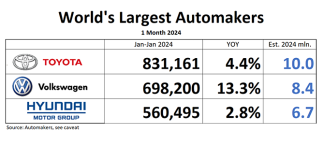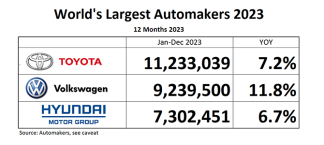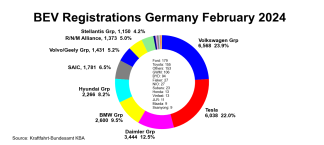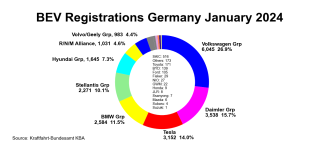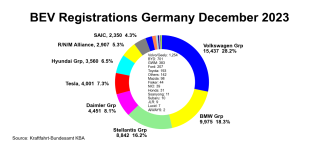
Closer than you think…
In my latest post at BloombergView, I look at Donald Trump and Hillary Clinton’s attempts to tap into the populist anger over the auto industry and am left wondering why neither is willing to attack the automakers who actually received bailout money. Trump has taken on Ford’s decision to double production capacity in Mexico and Clinton has attacked the supplier Johnson Controls for relocating to the UK in an “inversion” deal with Tyco, yet neither of these alleged automotive evildoers come close to matching the perfidy of the two bailed-out automakers. To wit:
General Motors, which received a $50 billion bailout, has received a net federal tax advantage of $52 million over the last three years in spite of billion-dollar profits, thanks to a controversial government decision allowing it to carry tens of billions of dollars in operating-loss credits through bankruptcy. GM is also leading the way on importing vehicles from China, and has focused its global export and R&D strategies around that huge potential market in the years since taxpayers bailed it out. Just like Ford, GM is doubling its Mexican production capacity, spending $5 billion on new assembly jobs south of the border.
Meanwhile, FCA isn’t even based in the U.S., having fled to a U.K. tax domicile after receiving more than $10 billion in bailout funds. Putting Fiat’s Italian plants in front of the line for new production, FCA anticipates that its North American production will remain flat through 2018 while imports from outside North America will expand to more than 10 times 2013 levels
This is at the heart of populist anger over the auto industry: Even if the bailout was necessary as an emergency measure, it’s failed to change the behavior of the firms who benefited from it or to deliver any reversal in the fortune for U.S. workers. Fiat-Chrysler survived to become a foreign firm by every possible metric, and GM became a tax-dodging Trojan horse for Chinese cars. And yet no American politician — Democrat or Republican, establishment or renegade — seems able to even identify these real culprits.
Not convinced that the automakers we bailed out are bad corporate citizens of the US? Read on…
In Fiat Chrysler’s case, the facts are fairly cut-and-dried: the firm is no longer based in the US, but operates out of the same UK tax jurisdiction that Johnson Controls has moved to. The fact that FCA received more than $10 billion in federal bailout money clearly makes them a worthy target of populist anger, as does the fact that it is dramatically increasing imports into NAFTA while keeping local production flat. Jobs building cars have gone abroad and the firm has abandoned the US tax jurisdiction, negating two of the major goals of the auto bailout. The other goal, making US automakers more competitive in “green car” technology, has also failed as FCA has the lowest fleet fuel economy in the US market [see page 42] and is apparently abandoning all but the lucrative, gas-guzzling truck and SUV segments of the business.
The facts in the GM case require a little more analysis in order to understand the full range of its disappointing behavior. Specifically, understanding GM’s tax situation requires some historical background as well as a look at its recent SEC filings. Though GM received more than $50 billion in TARP money during the bailout, it also received tens of billions worth of tax credits in the form of “NOLs” (credits based on past losses) thanks to government perversion of the bankruptcy process. The government allowed GM to ditch liability for product defects in bankruptcy (a decision with huge consequences during the recent ignition switch scandal), but that is typically allowed in bankruptcy. What isn’t usually allowed is the carry-through of tax NOLs, which are normally left behind when a company files for restructuring. Those credits were worth something in the neighborhood of $18 billion dollars, and they insured that GM would not pay US federal taxes for years.
So while politicians and the media have cheered GM’s return to profitability since the bailout, the automaker has not been returning the share of those profits that taxpayers would normally be entitled to. That’s especially galling because the vast majority of GM’s profits have in fact come from the United States.
Here is GM’s US income (all data from GM’s 2015 year-end SEC report) for the last three years:
2013: $4.88 billion
2014: $1.683 billion
2015: $5.594 billion
Here is the amount of current US federal income tax GM has paid (or benefits received) in those three years:
2013: ($34 million credit)
2014: ($23 million credit)
2015: $5 million paid
And here is what GM calls its “Income tax expense at US federal statutory rate”
2013: $1.977 billion
2014: $753 million
2015: $1.933 billion
By comparison, GM has been paying foreign tax jurisdictions dramatically more in current taxes on far lower income for the last three years:
2013: $512 million in current non-US taxes paid on $768 million in non-US income
2014: $671 million in current non-US taxes paid on $469 million in non-US income
2015: $860 million in current non-US taxes paid on $70 million in non-US losses
Taxes accounting is complicated, and I am far from being an expert in the field, but the picture is fairly clear here: GM has been paying hardly any taxes to the federal government even as its profits boom on the strength of US truck and SUV sales. US taxpayers rescued GM and US consumers are driving its post-bailout success but, thanks to the baffling decision to pull its NOLs through bankruptcy they are not sharing in the benefits of GM’s turnaround. When you layer in GM’s massive shift towards China for both production and R&D as well as its importation of Chinese cars to the US, it becomes obvious that the bailout did not magically make GM a good US corporate citizen (even leaving aside the gross negligence of GM executives and employees during the ignition scandal).
From a certain perspective it makes sense that the US political, regulatory and legal systems are eager to cut GM and Chrysler some slack. Neither firm is free from competitive and operational challenges, and FCA in particular faces challenges that could undo all the investments taxpayers made in them during the bailout. But again and again, we see the consequences of coddling companies who clearly have no national allegiance to the United States: the more governments do to make life easier on these companies the less urgency their leaders feel to make the tough choices necessary to transform their failed cultures. More importantly, none of the benefits the US government has extended to GM or Chrysler has fostered any sense of responsibility for or investment in the US’s economic well-being. The old chestnut that the definition of insanity is doing the same thing over and over again while expecting different results applies well here: treating GM and Chrysler like “national champions” has cost the American public billions of dollars (as well as other, harder-to-quanitfy costs) but done nothing to make them act like national champions.
Fans of the bailout constantly point out that governments around the world support their automakers, and they’re right. But those countries are also committed to economic strategies that are not purely market-based, and which carry corresponding pricetags. The US remains nominally a free-market economy, while actively tilting the playing field in favor of those companies whose interests it has chosen to champion, and as a result we get the worst of both worlds: the costs and competitive issues of a planned economy with the lack of cooperation and loyalty from private companies found in a free market system. When they needed a bailout, GM and Chrysler trumpeted their deep American history, their support for the war effort in World War II and their role as “creators of the American middle class,” arguing that these things obligated American taxpayers to rescue them. Now that they no longer need extraordinary taxpayer support, they are back to championing the advantages of a transnational free-market system that makes a virtue of sending jobs overseas, moving to the lowest tax jurisdiction and importing cars made in low-cost countries like China.
No one of these economic ideologies is perfect, and indeed the most successful political-economic systems often find advantages in combining aspects of both. Unfortunately the US relationship with its auto industry indicates that taxpayers are getting the worst of both worlds, while two deeply-challenged automakers are getting the best of both. That’s a situation that can only be sustained on the ignorance of the taxpayers who are getting the short end of the stick coming and going, which I think is why both Trump and Clinton are going out of their way to obfuscate the situation by attacking companies like Johnson Controls and Ford. As long as the political discourse around this issue remains muddled, this crony relationship can be sustained by selective deployment of free market and planned economy rhetoric. For all the talk of outsider anger at the political establishment in this election cycle, it seems that none of the candidates are willing or able to tackle this massive contradiction at the heart of the US economy.

